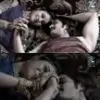Chandra arrives at Patliputra and Mura senses it in the gently wafting breeze blowing around her and the brilliant moonshine. She recalls the night of Chandra's birth and speaks to the letters she has etched on the ground as though she would to her son and says,"Chandra you were also born on one such brilliant moonlit night. My instinct tells me that we are going to meet each other soon!"Her instinct is not wrong either because the next shot we are shown in of Chandra entering the boundaries of Patliputra.
On the other hand, Chanakya also arrives at Patliputra with the background music of 'Asatoma Sadgamaya' playing on as he applies a tilak on his forehead applying the mud or matti of his motherland, Magadh. He meets his old school mate who is now a minister in Padmanand's cabinet. He is the same hunchbacked guy whom we saw with Amatya Rakshas and the Senapati Vakranaas whom Chandra and his friends had earlier raided.
We see two men from the same Alma Mater but with diverging viewpoints. The first sought his own professional betterment and career advancement by joining the existing king's cabinet while the other was least bothered about professional laurels or achievements. To him knowledge was not a means to an end but an end in itself. Chanakya's friend smiles and says, "You have not changed even one bit. You're still the same!" To this Chanakya just quips, "You wanted to serve a king but I have the ability to make a king if I will it!" None of them go any further into this discussion and leave it hanging at that point as it is irrelevant to the topic of their actual intention of meeting each other.
Chanakya requests his friend to get him an entry pass into Patliputra. The man tells that getting him an entry pass is not an issue but he feels that Padmanand may not take Chanakya's words in the right spirit as he hates Brahmins.
Then we get our standard Nand and Mura scene where Nand comes again to seek Mura's love and get insulted by her. It got me thinking what actual charms does a middle-aged Mura hold for a man like Nand? It is not love? Neither is it lust? This man must be having hundreds in his harems by now to beat Mura in beauty and youth! Even if Mura consents now, he must have known by now that he can only have her body but not her loyalties. My only conclusion from this is that Mura holds the fascination and charm that any unattainable thing holds for a human being. The hankering for a fruit beyond one's reach!
But by now even Nand's patience had wearied off! He orders his soldiers to take Mura to the town square and get her flogged in public. Mura again repeats herself like a stuck record player of how her son will avenge her! What else could the poor lady do but hold on to the last bit of straw for hope. She just left Chandra as a newborn. What was the guarantee that he had survived? But as they say 'Duniya umeed par kayam hai!' A person does not die as long as he has hope left. It is only when even hope dies that he has nothing to live for. This lady still has some hope, her son, and that's why she gets the courage to face everything coming her way. I really want to see a day when Nand is bereft of all hope. That would be the most perfect punishment for him before his death. To feel that there is nothing to remain alive and experience living hell and wish for death as a relief is the correct poetic justice for such a criminal like Nand!
The scene after this instantly shifts to Chandra thinking about the strange feeling of presentiment he is getting on setting foot in Patliputra. He ponders on what kind of strange connection do I have with this place? After this he witnesses several things which shock him out of his wits. He is totally disillusioned and disoriented by what he sees in the town square of Patliputra.
A man is being flogged and thrashed for not parting with his hard earned wealth by the soldiers. This sets little Chandra thinking, "What kind of state is this? What kind of king rules this state?" There is not even a semblance of some kind of administration present anywhere around him. There is no law and order of any sort. Everywhere he turns around, he finds the same scene, the weak getting exploited by the powerful.
Mura is led into the town square just then. The people are told that she is a traitor and her husband murdered the previous king and that Nand has ordered her to be stoned by the general public. Nobody even stops to think. Nand is highly unpopular and also cruel as a king but his orders are instantly followed and complied with by everyone the minute he says so without any pre- thought displaying mob and herd mentality of the worst kind.
Chandra barges in and tries to drive some sense in but in vain. They are saved by the announcement of the passage of Nandini's chariot the same way from further harm. There is a glance of smoldering hatred in Chandra's eyes for Nandini though for no fault of hers because she is a visual symbol of the decadent royalty. This exorbitant luxury that lives off the blood and sweat of its people without giving anything back to the people puts him off.
This utter lack of social responsibility displayed by the ruling king amaze and shock him to the core. It is almost similar to a mosquito or a parasite living off another person's blood and hard work. There is a searing anger in him to put things right if he can. But to do Chandra justice, he assumes that these things are happening behind the king's back and that he must be unaware or ignorant of all this.
His feelings are similar to what thousands and thousands of French citizens must have felt against the injustices and inequalities in their society hundreds and hundreds of years later during the French Revolution. The feeling of being exploited without getting one own due is very terrible. It keeps on simmering beneath the surface until it bursts open one fine day like a volcano. All great revolutions in history begin like this with a single spark which eventually turns into a blazing forest fire with the passage of time.
After this, both Chandra and Chanakya are standing in the line to gain admittance into the royal court of Magadh. When the soldiers refuse to let Chandra in even after seeing the Rajnandini coin given by Amatya Rakshas, he cooly and boldly stands his ground. In a steadily rising voice that becomes a shout by the time it ends, he asks to soldiers to ask Amatya Rakshas if he gave him this coin and also get ready for the punishment of not letting him in contrary to the intentions of the Chief Minister. Chanakya and his students are impressed.
Then comes the Nandini Tuladhan scene. Chandra' s coin sways the scale. Nand asks him who he is and how he got the coin to which he answers that Amatya Rakshas gave it to him. This is seconded by the words of AR himself who also recommends that he be inducted in the Magadh army. So far so good. Chandra begins enlightening Nand on the sorry state of affairs in his kingdom under the assumption that he is ignorant of all this. Nandini is duly dispatched inside and Nand clarifies that everything is happening according to his orders. Chandra is disenchanted that the root of all the evils he saw is Nand himself.
Nand asks Chandra to get lost. Another day he would perhaps have killed him but today being his daughter's birthday, he will give him an opportunity to escape. He says, "I give you five minutes! Run before my soldiers catch you! If they do, I will imprison you!"
Chandra has a quick repartee to this, "If they can't catch me in five minutes will you return all this wealth to the people?" Nand has no option but to accept this challenge to save a loss of face. Chandra wins the challenge but Nand goes back on his words and tells that there was no challenge in the first place and that all this is just a game for his entertainment.
Even here Chandra gets the last word by telling there is no use talking to one who cannot even keep up his words. Nand could keep all this wealth as it means nothing to him now. Chandra had won both the battle of brawns and wits beating Nand in his own game fair and square. He walks out with his head held up high and a dare devil attitude as though Nand did not deserve to be even his shatru and that he had wasted his time on an incompentent foe.
There could not have been a more resounding victory of the underdog. Not only was his voice heard but the powerful king was completely ground to dust in this encounter. Surely it was the day of the underdog. If there was a proud and paternal smile curling up Chanakya's lips and his eyes dancing with abandon and glee, I would not blame him. Chandra was so adorable and at the same time magnetic. Who could help being drawn and influenced by such a talented boy.
The next day, we have the Chanakya Apman scene. Chanakya barges into the court, apologizes for his intrusion but tells that he had to do so as this matter could not wait and starts off in full eloquence about a danger looming over the whole of Central India in the form of the foreign invader, Sikander and how it was imperative to devise an effective war strategy to deal with the situation and how he had one. He spreads out his map at a handy table in front of him and is about to proceed when he observes that his audience reaction is not what he would like it to be. He stops in his tracks. The vibes he gets is the kind any artiste or speaker would get before an audience intending to throw rotten eggs or rotten tomatoes.
Nand interrupts him and asks who he is to which Chanakya states his testimonials. Nand is unimpressed and tells who are you to tell me what I should do. Chanakya tells that this is a serious matter and he is not here for his own personal benefit. Nand is amused and tells that he is nothing but a comedian and insults Chanakya by throwing coins over him for the entertainment and catches hold of his shikha and chucks him out.
Chanakya is furious by now and retorts that just like Ravan he is inviting his own destruction. He vows to destroy him and tie up his shikha after drenching it in his blood just like Draupadi. Nand is unfazed and amused. He dismisses the entire episode as a case of dogs barking behind the back of an elephant. The soldiers drag Chanakya away and throw him in a heap at the outskirts of Patliputra.
Chanakya is hurt and bleeding. He gets up and realizes that a wild boar is about to attack him and takes a step backward after observing the blood oozing from his temples that is attracting the boar. Chandra leaps in between and fights the boar. He is furiously hurled off twice but Chandra is not the least bit scared or afraid. He doesn't even heed Chanakya's words to let go the boar. Finally he deals a heavy blow right on top of the head of the boar which is its weakest spot and scares it off from there.
Chanakya reprimands him telling you could have lost your life to which Chandra tells if I had not stepped in between you would have lost yours. Chanakya is visibly moved. Chandra opens his bundle and tells, "Let's share this food!" Chanakya refuses telling it is not sufficient for two people to which Chandra tells "Two half- full stomachs are better than one full stomach!" Chanakya sees a king in Chandra.
In this whole sequence of Chanakya Apman at the Sabha of Padmanand one could blame Chanakya for over enthusiasm and an error of judgement in going to the court without prior notice or intimation. But that's it! He got carried over by the fact that he was an esteemed professor at the Taxilla University and would be properly heard and received. Kings those days respected the learned and sought their advise on many matters.
Chanakya could have kept his thoughts to himself and given advice when Padmanand seeks it from him. But he knew that he would never ask but the situation was such that some action had to be taken and that too only by a powerful king like the king of Magadh. Moreover Chanakya would never have anticipated even in his wildest dreams that he would be insulted like that.
It was his nation at stake and he could not keep quiet. So even at the risk of not being heard, he had to give this option a try. Kings those days at least patiently listened though they might not act upon it. Chanakya perhaps would not have minded that though he might have been disappointed. He would not have become such an inveterate foe of Padmanand and wanted to destroy him at all costs. I have summed up my impressions of the episode along with a few of my views. I hope all of you like it. I would love to hear what all of you think about the episode. As far as I am concerned it met with all my expectations from it.































